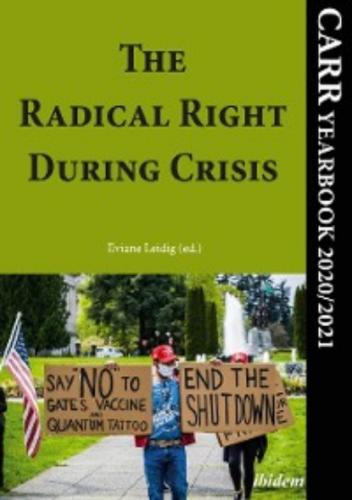The Radical Right During Crisis. Группа авторов
Ziegler15 writes about ‘Europe’s Disgrace’ when describing the horrific and untenable conditions in the refugee camps on the Greek island Lesbos.16
In Orbán’s rhetoric,17 the so-called “refugee crisis” and the global pandemic are merged into one huge “world-conspiracy”, a traditional antisemitic stereotype: the Hungarian-Jewish philanthropist George Soros is—repeatedly—accused of transporting “illegal migrants” to Europe and specifically, to Hungary. Simultaneously, these “illegal migrants” (i.e. refugees) are accused of bringing the COVID-19 virus to Europe. Hence, the fallacious argument implies that “the Jews” and the “illegal migrants” are to be blamed for the current global crisis. Of course, many other conspiracy theories regarding the pandemic are dominating the social media as well, all of which are targeting vulnerable and marginalized groups, on the one hand, and traditional media, specific countries (such as China) and influential CEOs such as Bill Gates, on the other.
Thus, I repeat and expand on the question posed in the title: Quo vadis, Europe?18 after the COVID-19 crisis? Will the EU member-states now be inclined to embrace more long-term solidarity and closer cooperation on the basis of recent crisis experiences, or will they become even more inward-looking and, in the long term, turn the EU into an economic union between independent nation states, without a contractually guaranteed consensus on human rights and peace?
The current crisis urgently calls for visions for the EU and, indeed, the world post-COVID-19. Borders have been closed, but viruses do not respect borders; neither does the climate crisis, to be sure. The economic consequences of measures to combat the crisis call for a new “Marshall Plan” for EU member states, according to the Commission President. This can only be implemented on a joint basis. In an interview broadcast in the Austrian news show ZIB2 (15 April 2020), the economist Clemens Fuest argued in detail that the rich EU member states, such as Austria and Germany, depend entirely on the poorer countries (such as Italy and Spain) for their production. A possible bankruptcy of these countries would therefore also affect ‘us.’ Transnational solidarity is therefore the order of the day—not the narrow, backward-looking thinking of nation states. Many political scientists19 and sociologists20 have expressed similar views.
The COVID-19 crisis has made it abundantly clear that expert knowledge21and expertise are in demand again today (after the populist zeitgeist had relied strongly on a politics of feelings and the power of “common sense”). Hopefully, European politicians will not quickly dismiss the lessons of the crisis, but will be forced to develop and agree on sustainable solidarity with the vulnerable and social programmes in order to be prepared for new, cross-border crises—which will surely come.
Dr Ruth Wodak is a Senior Fellow at CARR and emerita distinguished professor of discourse studies at Lancaster University and affiliated with the University of Vienna.
1 Markus Rheindorf and Ruth Wodak‚ “Borders, Fences and Limits—Protecting Austria from Refugees: Metadiscursive Negotiations of Meaning in the Current Refugee Crisis,” Journal of Immigrant & Refugee Studies 16 no.1–2 (2018): 15-38.
2 Ruth Wodak, The Politics of Fear: The Shameless Normalization of Far-right Populist Discourses (London: SAGE, 2021).
3 Anna Triandafyllidou, Ruth Wodak and Michał Krzyżanowski, eds. The European Public Sphere and the Media Europe in Crisis (London: Palgrave MacMillan, 2009).
4 Florian Oberhuber, Christoph Bärenreuter, Michał Krzyżanowski, Heinz Schönbauer and Ruth Wodak, “Debating the European Constitution: On Representations of Europe/ the EU in the Press’, JLP 4, no. 2 (2005): 227-71.
5 Jan Zielonka, “Has the Coronavirus Brought Back the Nation State?,” Social Europe, March 26, 2020, https://www.socialeurope.eu/has-the-coronavirus-brought-back-the-nation-state.
6 Johannes Pollak and Peter Slominski, Das Politische System der EU (Munich: Facultas, 2012).
7 See “Türkei-Krise: Syrischer Arzt Schildert Dramatische Situation- ‘Massenhinrichtungsstopp’,” Merkur, March 28, 2020, https://www.merkur.de/politik/fluechtlinge-tuerkei-griechenland-syrien-erdogan-merkel-videos-asyl-eu-grenze-news-merz-zr-13566876.html.
8 EU Commission, “Kommission analysiert Gesundheitssysteme der Mitgliedstaaten,” https://ec.europa.eu/germany/news/20171123-gesundheitssysteme_de.
9 Antje Wiener, Tanja A. Börzel and Thomas Risse, European Integration Theory (Oxford: Oxford University Press, 2018).
10 “14 unterzeichnen Protestbrief. Unmut der EU-Staaten über Ungarns Notstandsgesetz wächst,” Kleine Zeitung, April 2, 2020, https://www.kleinezeitung.at/international/corona/5795049/14-unterzeichnen-Protestbrief_Unmut-der-EUStaaten-ueber-Ungarns.
11 Jan-Werner Müller, “What Happens When an Autocrat’s Conservative Enablers Finally Turn on Him? Right-Wing European Politicians Rebuked Hungary’s Viktor Orbán. But That Could Radicalize Him Even More,” The Atlantic, September 13, 2018, www.theatlantic.com/international/archive/2018/09/orban-hungary-europe-populism-illiberalism/570136/.
12 Jan-Werner Müller, “Populists are Likely to Benefit from the Coronavirus Pandemic,” Institute for Human Sciences, Vienna Blog, April 16, 2020, https://www.iwm.at/always-active/corona-focus/jan-werner-mullerhow-populists-will-leverage-the-coronavirus-pandemic/.
13 Cas Mudde, “The 2019 EU Elections: Moving the Center,” Journal of Democracy 30 no.4 (2019): 20-34.
14 Ruth Wodak, “Entering the ‘Post-Shame Era’—The Rise of Illiberal Democracy, Populism and Neo-Authoritarianism in EUrope,” Global Discourse 9, no. 1 (2019): 195-219.
15 Jean Ziegler, Die Schande Europas (Munich: Bertelsmann, 2020).
16 Sebastian Leber and Kai Müller, “Die doppelte Hölle von Lesbos,” Tagesspiegel, March 17, 2020, https://www.tagesspiegel.de/themen/reportage/coronavirus-trifft-auf-fluechtlingskrise-die-doppelte-hoelle-von-lesbos/25649140.html.
17 Markus Salzmann, “Hungarian Government Uses Corona Pandemic to Promote Racism,” World Socialist Web Site, March 19, 2020, https://www.wsws.org/en/articles/2020/03/19/hung-m19.html.
